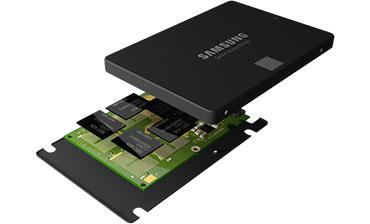Review: Samsung 850 EVO SSD Stacked For Speed

Can Samsung pull off a "three-peat?" The Seoul, South Korea-based memory giant this week unveiled the 850 EVO series, its latest solid-state drives for professionals and consumers that Samsung claims will deliver unmatched performance and endurance due to its 3-bit vertical NAND stacked-cell technology. Starting at $99 and available in 120-, 250-, 500-GB and 1-TB capacities, the drives primarily target consumer upgrades, students and corporate deployment, and mark the first time Samsung has employed vNAND in a consumer-grade drive.
How much faster can SSDs get? In September 2012, the CRN Test Center reported that Samsung's 500-MBps 840 Series had doubled the throughput of the prior-gen SSD 830 series, which themselves delivered twice the speed of the drives that preceded them. Can Samsung do it again?
[Related: Latest Samsung SSD Doubles Performance Again]
To find out, we plugged the 500-GB SSD supplied for testing into our latest test fixture, which by coincidence is quite similar to the fixture used by Samsung for its own performance testing. CRN's fixture centers around an Intel Core i7-4790 processor running at 4.0GHz on an EVGA Z97 Classified motherboard running 64-bit Windows 7 Ultimate N with 8 GB of DDR3 memory. We too used IOMeter to measure transaction processing and data throughput performance. Before recording any benchmarks, we fine-tuned the app so that the number of pending I/O operations per target yielded maximum performance for sequential operations.
Starting with the smallest transactions, we measured sequential reads of 512-byte packets at a maximum sustained rate of 85,200 IOps. When switching to 4K-byte packets, the sequential rate increased to 94,500 IOps, close to its theoretical maximum of 98,000 IOps. The rate slowed to 90,600 IOps for 100 random reads. When testing sequential reads of 32K packets, we observed a sustained data transfer rate of 518 MBps, the fastest throughput that this drive was able to deliver, and close to its theoretical maximum of 540 MB/s. When we introduced 50 percent randomness, throughput slowed to 501 MBps. Throughout these tests, transaction speed hovered at or slightly above 16,000 IOps.
Three of the four 850 EVO models use an all-new MGX controller, which Samsung said is designed to help increase performance on lower-capacity drives, which contain fewer lanes through the cells and therefore offer fewer pathways to make connections. The 1-TB model uses Samsung's existing MEX controller. All models ship with Samsung Magician drive monitoring and PC optimization software, plus cloning software for easing data migration. Available worldwide later this month, Samsung 850 EVO drives will list for $99 for 120 GB, $149 for 250 GB, $269 for 500 GB and $499 for 1 TB, and they're covered by a five-year warranty. Not a three-peat performancewise, but the CRN Test Center still recommends the 850 EVO.
PUBLISHED DEC. 10, 2014